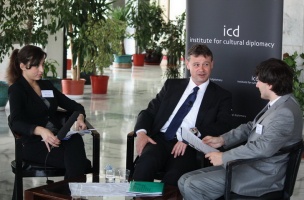H.E. Amb. Jean-Daniel Ruch
Cultural Diplomacy in Combatting Extremism and Promoting Interaction By H.E. Amb. Jean-Daniel Ruch (Special Representative for the Middle East, Foreign Ministry of Switzerland)
[After the dismantling of Gaddafi’s regime] our policy was to provide humanitarian assistance [in Libya], first by opening an office in Benghazi during the Civil War, and then for the rest of the population once the conflict was over. Now we are trying to help them in building their institutions- we have developed a whole development program to try and build the institution, good governance, and rule of law in Libya.
…
It is the task of the politicians and the leaders of the countries to make sure that no one in their own population is being left behind intellectually and emotionally.
…
You will always have Extremists, and to deal with violent extremism isn’t the matter of culture, but of the police and the prosecution. Culture can play a very important role by helping to keep the groups of violent extremists as small as possible. Culture through all its facets can be used to provide a more positive, real image of another group. With regards to Islam in Europe, exhibitions on the treasures of Islam can be very useful, as can TV programs on how much European culture owes to Islam.
…
We are associated with some projects on history books in the Middle East. The idea is not to agree on the narrative of the Israelis and the Palestinians for instance, but at least to try to agree to disagree. It is very interesting to ask a group of Israeli and Palestinian historians to write their narrative of a specific event, and then to put them around the table and try to discuss. I think that’s a way we can slowly deal with the past: correct some prejudices and some images.
…
Contact between artists is always the easiest. Wherever you go in the Balkans, they can still sing the same songs from the same artists as before. A group of young people from Novi Sad in the north of Serbia decided, as part of the election campaign against Milosevich, to make a cultural festival, where they would invite rock groups also from Croatia and Macedonia, and create theater plays with discussions from the public. It was opposition through culture. Nowadays, this festival has become the largest open air event in Europe, where you have people from Hungary, Croatia, Macedonia, Bosnia, and of course Serbia going, and enjoying themselves together, and I think that’s a very modern way that Cultural Diplomacy can help- having interaction between many people.
- The Ankara Conference on Peace Building & Reconciliation; Ankara, Turkey, April 2012
